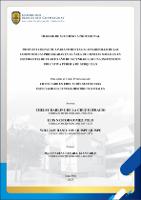Propuesta didáctica para fomentar el desarrollo de las competencias priorizadas en el área de ciencias sociales en estudiantes de cuarto año de secundaria de una institución educativa pública de Surquillo

Fecha
2023Autor(es)
De la Cruz Eufracio, Chelsy Darline
Gomez Polo, Luis Nestor
Quispe Quispe, William Hanilton
Metadatos
Mostrar el registro completo del ítemResumen
El presente trabajo de suficiencia profesional tiene como objetivo diseñar una propuesta
didáctica para fomentar el desarrollo de las competencias priorizadas en el área de Ciencias
sociales en estudiantes de cuarto año de secundaria de una Institución Educativa Pública de
Surquillo. Este trabajo, toma como base el Paradigma Sociocognitivo Humanista y los
propósitos de aprendizaje presentados en el Currículo Nacional de Educación Básica, de esta
forma permite al estudiante relacionarse con las competencias, capacidades, destrezas, así
como con los valores y actitudes. La propuesta presenta tres acápites: el primero consiste en la
descripción del trabajo, el diagnóstico y las características de la institución educativa, así como
los objetivos y la justificación; en el segundo acápite, se profundiza en el marco teórico, en la
cual se da a conocer las diversas teorías referentes y sus autores como: Jean Piaget, David
Ausubel y Jerome Bruner pertenecientes al Paradigma Cognitivo; Lev Vygotsky y Reuven
Feuerstein del Paradigma Socio-Cultural-Contextual; Robert Sternberg (Teoría Triárquica de
la Inteligencia) , Martiniano Román y Eloísa Diez (Teoría Tridimensional); y, en el tercer
acápite, se presenta la programación curricular que contiene principalmente la evaluación
diagnóstica, la programación anual y unidad de aprendizaje con sus respectivas sesiones, fichas
guías, fuentes de lectura e instrumentos de evaluación; y finalmente, el proyecto de aprendizaje. The present work of professional sufficiency aims to design a didactic proposal to promote the
development of prioritized competencies in the area of Social Sciences in fourth year high
school students of a Public Educational Institution of Surquillo. This work is based on the
Humanistic Sociocognitive Paradigm and the learning purposes presented in the National Basic
Education Curriculum, in this way it allows the student to relate to the competences, abilities,
skills, as well as with the values and attitudes. The proposal has three sections: the first consists
of the description of the work, the diagnosis and the characteristics of the educational
institution, as well as the objectives and justification; in the second section, the theoretical
framework is deepened, in which the various referring theories and their authors are made
known, such as: Jean Piaget, David Ausubel and Jerome Bruner belonging to the Cognitive
Paradigm; Lev Vygotsky and Reuven Feuerstein of the Socio-Cultural-Contextual Paradigm;
Robert Sternberg (Triarchic Theory of Intelligence), Martiniano Román and Eloísa Diez
(Three-dimensional Theory); and, in the third section, the curricular programming is presented,
which mainly contains the diagnostic evaluation, the annual programming and learning unit
with their respective sessions, guide sheets, reading sources and evaluation instruments; and
finally, the learning project.

